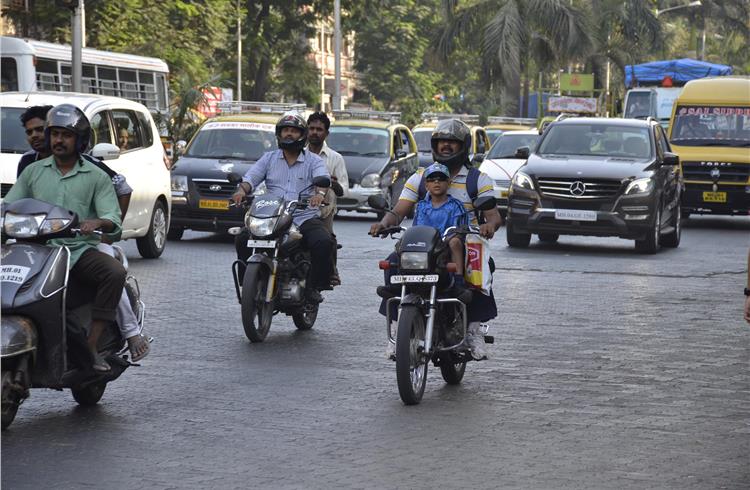Vehicle safety is affordable, political commitment is key, say speakers at Autocar Professional webinar
The issue of vehicle safety in the Indian context and global context was discussed by four experts in India and overseas in Autocar Professional’s first webinar held on May 4, 2015.
The issue of vehicle safety in the Indian context and global context was discussed by four experts in India and overseas in Autocar Professional’s first webinar on the theme of 'Towards A Safer India' held on May 4, 2015.
Held to commemorate the start of the UN Safety Week, the experts threw light on technology, costs, country legislation and the roadmap ahead in their presentations and subsequent deliberations.
The four experts were James Remfrey, director, Technology Intelligence within Systems & Technology, Division Chassis & Safety, Continental; David Ward, secretary general, Global New Car Assessment Programme; Kartikeya Joshi, marketing and sales head, Bosch Chassis Systems India; and Ashok G Joshi, senior GM, Vehicle Attributes & Technical Service, Tata Motors.
In his opening remarks, David Ward of GNCAP spoke about the aim of reducing vehicle fatalities by 50 percent by the year 2020 which is UN’s Decade of Action plan. While alluding to what his organization, GNCAP has done, he highlighted the need for government to provide fiscal incentives to ensure that people buy safe vehicles. Ward stressed that it is possible for carmakers to provide safety features in the vehicles they manufacture and that it would cost in the region of $200 (Rs 12,634) per vehicle to meet minimum crash standards.
Kartikeya Joshi of Bosch Chassis Systems India alluded to the work that Bosch has done in India along with JP Research to study the Indian accident scenario in its RASSI initiative. Studying close to 800 examples of accidents in India, he made the important remark that 22 percent of accidents on India’s roads could have been avoided had the vehicles been equipped with ABS. He mentioned that Bosch is now doing an analysis of ESP and a report is expected in 2-3 months’ time.
Bosch is investing in India for localisation of critical automotive technologies to enhance their penetration in the price-sensitive domestic market. The ninth-generation ABS in Tata Motors' Zest sedan is one such example.
Joshi in his presentation said that Bosch's commitment towards a safer India includes conducting accident research in India to create India-specific solutions.
James Remfrey of Continenental spoke about his company’s commitment to launching safe products and the work that a 1,000-strong group of engineers at the company’s centre has been working.
Remfrey said Continental is working on a three-pronged approach of 'sense, plan and act' to develop technololgies which are relevant for India. He highlighted that developing advanced efficient braking systems is key as the best-case scenario is when an almost-imminent accident does not take place.
Finally, shedding light on the India situation from an Indian carmaker, Ashok Joshi of Tata Motors spoke about the need for better road infrastructure as well as the upcoming changes in India’s safety agenda which include stricter safety protocols and also the 56kph speed criterion for frontal crash, and safety for pedestrians that will become mandatory from 2017.
Joshi also threw light on issues of safety on trucks and the incoming Bus Code which he said are steps in the right direction.
Answering over 20 questions from close to 100 participants, Ward stressed the need for India to align itself to global best practices in crash testing and safety. He cited the example of China that initially began with a low speed limit of 50kph but quickly upgraded this in response to buyer demand. Speakers were, by and large, unanimous on the fact that improved road discipline, better road infrastructure and post-accident care are key issues that stakeholders must address. Consumer empowerment as well as driver training issues were also discussed.
The webinar ended on a note of optimism with speakers confident that the use of ABS in India, currently at 20 percent, could go up to 55 percent by the year 2020 in India. India’s efforts to enhance road and vehicular safety came in for praise even as the MV Act and a Bharat New Vehicle Safety Assessment Programme or BNVSAP is being given shape by the government authorities concerned. Above all, political commitment is key and India’s efforts in this respect came in for praise.
RELATED ARTICLES
Bosch hydrogen engine tech-powered truck to be on Indian roads this year
The global supplier of technology and services is betting big on both electromobility and hydrogen. While announcing the...
IIT Bombay inaugurates Arun Firodia Research Floor
IIT Bombay, one of India’s top technical and research institutions, honours Kinetic Group chairman Dr Arun Firodia, one ...
Maruti Suzuki expands capacity at Manesar plant by additional 100,000 units
New assembly line at Plant A expands total manufacturing capacity at the Manesar plants to 900,000 units per annum. Alon...





 By Autocar Pro News Desk
By Autocar Pro News Desk
 04 May 2015
04 May 2015
 2980 Views
2980 Views









